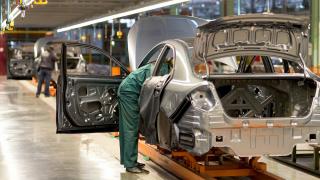
The UK's automotive industry, once a staple part of our country's manufacturing efforts, has now been in question for quite some time. With reports of some of the biggest automotive OEMs moving production overseas, the future of the industry's presence within the UK is now under threat.
Will recent Brexit trade deals be enough to entice automotive manufacturers to remain within the UK? Or have we lost one of our nation's industries forever to political unrest?
The Brexit Effect:
Compounding the referendum result was a lack of clarity surrounding trade deals.
The automotive industry was very clear about which side of the Brexit debate they stood on in the run-up to the 2016 referendum. With potential job losses and lack of UK investment cited as possible outcomes of the UK's decision to leave the EU, the automotive industry at large argued that remaining was the best option.
When this failed to come to pass, many UK car manufacturers were quick to move their production facilities overseas. Automotive production hubs were closed within the UK, resulting in the loss of jobs that had overshadowed the industry's predictions from the start. Compounding the referendum result was a lack of clarity surrounding trade deals; from 2016, when the UK's political future was sealed, until December 2020, merely days before the UK officially left the EU, there was still no word on what - if any - trade deals would come into effect post-Brexit.
Many major car manufacturers had feared the possibility of a no-deal Brexit and vocalised their growing concerns during this period. However, when a trade deal did finally materialise between the UK and the EU on 24th December 2021, it was thought by many that too much time had elapsed in uncertainty and that the damage to the UK automotive industry was already done.
Indeed, the automotive industry has agreed with this sentiment and has also pointed out the increased paperwork and box-ticking brought about by Brexit will mean that they incur hidden charges. Whereas heightened administrative procedures only applied to a select amount of vehicles before the UK's departure from the EU, manufacturers are now forced to prove that their vehicles meet the required criteria for exemption from tariffs. This increase in workload, especially within the early days of Brexit where a lot of confusion still presides, has meant that manufacturers will struggle to meet pre-Brexit production levels for quite some time.
READ: How Will Brexit Affect UK Subcontract Sourcing?
COVID-19 and the Automotive Industry:
Of course, Brexit is not entirely to blame for the automotive industry's national downturn. Like many other industries, the automotive sector was left reeling from the effects of the COVID-19 pandemic and the subsequent national lockdowns.
The Society of Motor Manufacturers and Traders (SMMT) reported that the automotive industry saw a significant reduction in production levels during 2020, with car output falling by 29.3% over the course of the year. This worrying statistic illustrates the full effects of the pandemic, which came at a pivotal time for the automotive industry and indeed, the UK overall.
Although predictions for this year are much more optimistic - albeit cautiously - there is an underlying fear that the transition from 2020 to 2021 will see the automotive industry jump out of the frying pan and into the fire. The combination of the ongoing global pandemic and the political situation at home has the potential to create a perfect storm for the UK's automotive industry. With uncertainty still remaining over the ongoing repercussions of both situations, it is hard to say whether estimated production rates will be reached this year, or what the long-term automotive landscape will look like on a national scale.
READ: How Has a Global Pandemic Shaped the UK's Subcontract Purchasing Landscape?
Is Investment the Answer?
The shape of the automotive industry is set to change globally.
The shift to electric vehicles could either help or hinder the UK's automotive production efforts in the near future. With the sale of diesel and petrol-powered vehicles prohibited from 2030, the shape of the automotive industry is set to change globally. Existing plant and supply chains will need to be overhauled to accommodate the shift in production, meaning that there are investment opportunities available to bolster the UK's output.
The big question is where the batteries for electric cars will be manufactured. If it is feasible to set up a production plant for electric vehicle batteries within the UK, then this will go a long way in re-establishing the UK as a key player within the automotive industry - as well as helping UK automotive manufacturers to potentially avoid costly import charges. As tariff avoidance currently hinges on 40% of the overall car assembly being manufactured within the UK or the EU, being able to produce electric vehicle batteries nationally would be a huge step in the right direction for the UK automotive industry overall.
READ: Budget 2020 - Shortfalls of the Building Safety Fund
Looking to the Future:
The future of the UK's automotive industry has yet to be determined, though the upcoming investment opportunities, as well as the existence of a trade deal are key factors within its recovery. Though the existing trade deal may not be a perfect outcome, it does at least offset some of the financial implications of automotive export, which accounts for the fate of a huge percentage of UK-manufactured cars.
The health climate of 2021 will also be a huge factor when it comes to the output for the year and will depend largely on the roll-out of the current vaccination programme. This will hopefully help UK manufacturers across all industries to ramp up production throughout the year and give the economy the boost it desperately needs to overcome the challenges it has recently been dealt.
In the meantime, the death knell for the UK automotive industry is far from being sounded; instead, the coinciding shift towards electric vehicles will hopefully be well-timed enough to lead to a new lease of life.
